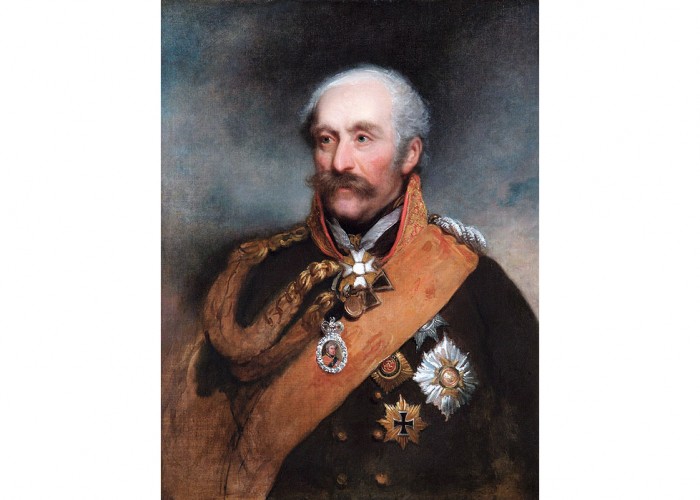Field Marshal Prince von Blücher, George Dawe
This painting shows Marshal Gebhard Leberecht von Blücher, who commanded the Prussian troops that fought in the Battle of Waterloo. The Prussian army arrived in the afternoon of the Battle of Waterloo, and were vital to defeating the French. Without the extra 50,000 German soldiers led by von Blücher, the Anglo-Allied army might well have lost at Waterloo.
At the time of the Battle of Waterloo, Germany was divided into several different states, one of which was the Kingdom of Prussia. Prussia had been invaded by the French during the Napoleonic Wars, and when Napoleon returned from exile in 1815, the Prussians were one of the Allied nations which sent an army to try and defeat the French Emperor. Marshal von Blücher led this army.
In recognition of earlier successes against the French, Blücher had been promoted to Field Marshal and made Prince of Wahlstatt, an aristocratic title meaning “Prince of the Battlefield”. At the age of 72, Blücher was the oldest man on the battlefield. He had been a soldier for 57 years, first joining the Swedish army aged just 15.
The Prussian army was defeated by the French two days before the Battle of Waterloo, at the Battle of Ligny on 16 June 1815. Blücher himself was knocked off his horse and almost killed by the French cavalry. However, he rejoined his army, who regrouped and moved north toward the Anglo-Allied army. Blücher claimed he recovered from his injuries by being rubbed with brandy and drinking champagne.
The Prussian army arrived on the battlefield of Waterloo at about 4.00pm, after over four hours of brutal combat between the French and British. The Duke of Wellington, believing that his army was on the point of being overwhelmed, at one point remarked: “Give me night or give me Blücher!”
The Prussians had marched since 4.00am along muddy country roads, but even exhausted they quickly threatened to overwhelm the French. Napoleon had to order increasing numbers of troops east to try and hold off the approaching Prussians, while his main force still tried to finally break the British to his north. By 8.30pm the combined armies had decisively defeated the French, who fled from the battlefield. Allied victory made Blücher into a hero across Europe.
This portrait was painted by the British artist George Dawe in 1818, as a special commission for the Duke of Wellington. It still hangs in Wellington’s London residence, Apsley House.
-
Curatorial info
- Production Date: 1818
- Creator: George Dawe
- Material: Oil on canvas
- Technique: Oil painting
-
Use this image
You can download and use the high resolution image for use in a non-profit environment such as a school or college, but please take note of the license type and rights holder information below
- Rights Holder: Copyright English Heritage / Apsley House.
- License Type: All Rights Reserved
Find it here
This object is in the collection of Apsley House – English Heritage






